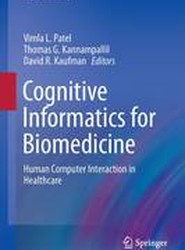(To see other currencies, click on price)
MORE ABOUT THIS BOOK
Main description:
This book provides foundational coverage of key areas, concepts, constructs, and approaches of medical informatics as it applies to clinical research activities, in both current settings and in light of emerging policies. The field of clinical research is fully characterized (in terms of study design and overarching business processes), and there is emphasis on information management aspects and informatics implications (including needed activities) within various clinical research environments.
The purpose of the book is to provide an overview of clinical research (types), activities, and areas where informatics and IT could fit into various activities and business practices. This book introduces and applies informatics concepts only as they have particular relevance to clinical research settings.
Feature:
Detailed focus on clinical research informatics without being diverted into areas covering actual clinical practice
Extensive coverage of the intersection between clinical research, data standards, and information science
Back cover:
Clinical research informatics (CRI) is the application of informatics principles and techniques to support the spectrum of activities and business processes that instantiate clinical research. Informatics, defined generally as the intersection of information and computer science with a health-related discipline, has a foundation drawn from many well-established, theory-based disciplines, including computer science, library and information science, cognitive science, psychology, and sociology. The newly articulated yet fundamental theorem of informatics states that information technology should be used to enable humans to function and perform better together than humans alone, and so informatics is a source for supportive technologies and tools that enhance – but not replace – unreservedly human processes.
Clinical Research Informatics contributes to the ongoing dialogues among researchers and practitioners in CRI as they continue to rise to the challenges of a dynamic and evolving clinical research environment. The development of CRI as a sub-discipline of informatics, and as an independent/maturing professional practice area in its own right, drives a growing pool of scientific literature based on original CRI research, and high-impact tools and systems will be developed. CRI leaders and stakeholder groups will continue to support and create communities of discourse that will address much needed practice standards in CRI, improved safety and efficiencies in clinical research, data standards in clinical research, policy issues, educational standards and instructional resources.
The Editors and contributors to this book are among the most active and engaged in the CRI domain and provide an excellent primer for deeper explorations into this emerging discipline. Certain themes are highlighted, including the changing role of the consumer, movement toward transparency, growing needs for global coordination and cooperation on many levels, and the merging together of clinical care delivery and research as part of a changing paradigm in global healthcare delivery – all in the context of rapid innovations in technology and explosions of data sources, types, and volume. This book is therefore of considerable interest to all students of biomedical informatics, from the newcomer to the professional informatician.
Contents:
Section I: Contexts of Clinical Research Informatics.- Introduction to Clinical Research Informatics.- From Notations to Data: The Digital Transformation of Clinical Research.- Clinical Research Environment. - Statistical and Study Design Foundations of Clinical Research.- Informatics Approaches to Participant Recruitment.- The Evolving Role of Consumers.- Clinical Research in the Post-Genomic Era.- Section II: Data Management and Systems in Clinical Research.- Clinical Research Information Systems.- Study Protocol Representation.- Data Quality in Clinical Research.- Patient-Reported Outcome Data.- Biobanking Challenges and Informatics Opportunities.- Patient Registries.- Section III: Knowledge Representation and Discovery.- Knowledge Representation and Ontologies.- Non-hypothesis Driven Research: Data Mining and Knowledge Discovery.- Natural Language Processing, Electronic Health Records, and Clinical Research.- Section IV: The Future of Clinical Research, Health, and Clinical Research Informatics.- Data Sharing: Electronic Health Records and Research Interoperability.- Standards Development and the Future of Research Data Sources, Interoperability, and Exchange.- Pharmacovigilance.- Clinical Trials Registries and Results Databases.- Future Directions in Clinical Research Informatics.- Index.
PRODUCT DETAILS
Publisher: Springer (Springer London)
Publication date: August, 2013
Pages: 428
Weight: 658g
Availability: Not available (reason unspecified)
Subcategories: General Issues, General Practice
MEET THE AUTHOR
Drs. Richesson and Andrews work with a data centre that supports a variety of diseases in the Pediatric Epidemiology Centre at the University of South Florida.
Dr. Richesson has a very broad training on standards and wrote the first published journal article on the topic of data standards in clinical research.
Dr. Andrews is a tenured professor in Information Science and has published several articles in leading journals in clinical research informatics.
From the same series
Christopher G. Chute
Adrian Stavert-Dobson
John T. Finnell
Marion J. Ball
Marion J. Ball
Thomas Wetter
Vimla L. Patel
Naakesh A. Dewan
Chris McCarthy
Kathryn J. Hannah
Stephen Goundrey-Smith
Sajeesh Kumar
William F. Bria
Naakesh A. Dewan
Sajeesh Kumar
Philip R.O. Payne
Stephen Goundrey-Smith
Valerie Powell
J.A. Magnuson
Vimla L. Patel
Morris F. Collen
Gondy Leroy
Sajeesh Kumar
Alain Venot
Eta S. Berner
Bruce R. Schatz
Prakash M. Nadkarni
Naakesh A. Dewan
Joan M. Kiel
Reinhold Haux
Marion J. Ball
Michael K. Bourke
Krzysztof Zielinski
Chris McCarthy
Marion J. Ball
Sajeesh Kumar
Marion J. Ball
Robert M. Kolodner
Patrice Degoulet
Kimball I. Maull
Stephen Goundrey-Smith
Erica L. Drazen
Joyce C. Niland
Stephen Goundrey-Smith
Peter L. Elkin
Edward H. Shortliffe
Nancy M. Lorenzi
James Andrews
Valerie Powell
Louis M. Abbey
Morris F. Collen
Lawrence L. Weed
Patricia Flatley Brennan
Gondy Leroy
Sajeesh Kumar
Bruce Schatz
Prakash M. Nadkarni
Christoph U. Lehmann
Reinhold Haux
Marion J. Ball
Marion J. Ball
Rudi van de Velde
Nancy M. Lorenzi
Deborah Lewis
Kenneth Goodman
Eleanor Callahan Hunt
Marion J. Ball
Marion J. Ball
Patrick W. O'Carroll
James G. Anderson
James E. Demetriades
Rajeev K. Bali
Marion J. Ball
Harold P. Lehmann
Susan Houston
Eta S. Berner
Patricia Flatley Brennan
Charles P. Friedman
Reinhold Haux
Naakesh A. Dewan
Ursula Hubner
Nancy M. Lorenzi
Keith Ruskin
Christoph U. Lehmann
William F. Bria
Keith Ruskin
Susan Houston
Ursula Hubner
Patricia Flatley Brennan
Eta S. Berner
Rajeev K. Bali
Harold P. Lehmann
Marion J. Ball
































































































